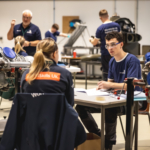Tumultuous isn’t a word that I use lightly, but I can think of no better description of the past few months politically. We had the calling of an unexpected general election, an even more unexpected result and everyone is now trying to make sense of what this all means. For everyone with any interest in skills, the feeling is shared. So, it’s worth reflecting on where we are and what lies ahead.
Westminster is now away until September, but that doesn’t mean MPs have their feet up. Business Secretary Greg Clark was out in Tunbridge Wells the day after Parliament went into recess to meet his constituent and Team UK member Alex Wood. Alex will be competing at WorldSkills Abu Dhabi – the ‘skills olympics’ – this October with 33 other apprentices and technical learners. As Greg said, this is both a fantastic opportunity to showcase the UK and help build the skills our economy needs. Other Team UK members will be catching up with their MPs during the summer and we are incredibly grateful for the strong and passionate support the team gets from all the main parties across the UK.
A new UK government inevitably means new faces and whilst we were sorry to see Robert Halfon move on as our DfE sponsor minister, we look forward to contributing to Anne Milton’s exciting agenda for the sector. Robert of course is going to remain firmly involved across skills and apprenticeships as Chair of the Education Select Committee in the House of Commons. We were so pleased too that Gordon Marsden retained his Labour shadow skills brief – Gordon is such a strong advocate of the work we do to support young people’s career development.
The 2015 Westminster Parliament was an exciting time for skills. It marked the beginning of a new focus on apprenticeships with the 3m target and introduction of the levy. The UK Government showed that it intends to place skills at the heart of its new Industrial Strategy. The Technical and Further Education Act became law, laying much of the groundwork for the skills revolution that Justine Greening is leading in England. It was a positive two years for skills. Perhaps the most positive that there has been for a long time when you add into the mix the Brexit impact of putting ‘home-grown skills’ at the top of everyone’s agenda.
If we look forward to the autumn, I think we can be equally optimistic about what’s to come as we already have a reasonable idea of what to expect. The UK Industrial Strategy White Paper – the next phase of its development – is pencilled in for early in the autumn and we know that productivity, R&D, science and innovation and infrastructure investment (particularly digital) will be at the heart of what the Government proposes. The common thread across all these themes is the necessity of world-class skills to provide the beating heart that will drive British industry through arguably the most important decade in a generation. We have one chance to get this right and ensuring high quality careers advice and guidance for our young people is fundamental to that. The Careers Strategy for England has been under development since 2015 and its publication this autumn is much needed – joining the existing strategies for N.Ireland, Scotland and Wales. Our work with the Careers & Enterprise Company in England has demonstrated the potential of peer-to-peer careers advice. Our young role models, who’ve excelled in our competitions with heaps of positive experience, are speaking to other young people in schools making career choices. We know that this programme, which Anne Milton has described as ‘very powerful’, is transformative and want to grow it alongside the strategy.
The words technical and technology will feature heavily in the skills lexicon in England over the next five years. ‘Technical’ in the context of T-levels which will provide the measures against which the skills revolution will be judged. A qualification that has the potential to give FE a gold standard of its own which has the potential to stand proudly alongside A-levels. They could provide the external validation which will make parity of esteem a reality for our young people. It’s vital that they are benchmarked against world-class standards. We are already working with the Institute for Apprenticeships to bring our expertise from competing internationally to bear on its work which will encompass the evolution of T-levels from next year. We have also had the confirmation that the Government will be tendering for Institutes of Technology in England after the Westminster Parliament resumes. WorldSkills UK recognises the potential for IoTs to act as high quality hubs for STEM skills. We stand ready to collaborate with providers to harness our competitions methodology to attract students, encourage curriculum innovation and provide CPD for teaching staff based on our expertise in careers advice and achieving world-class standards in STEM.
There has never been a more exciting time for skills – so let’s use the reform opportunities ahead to help politicians of all parties make sure more and more young people get the best start in work and life.


